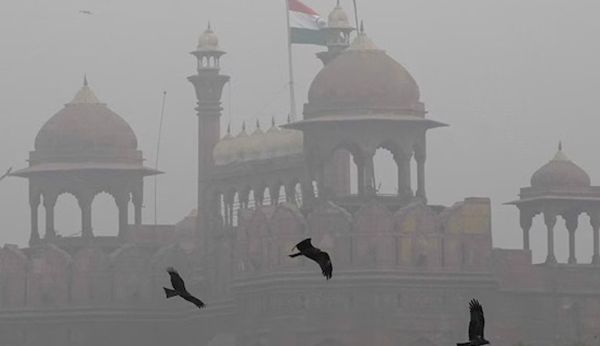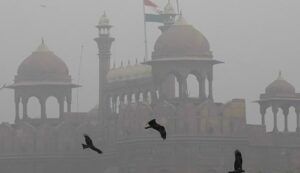
New Delhi: On Monday morning, Delhi’s air quality deteriorated as a dense layer of pollution covered several areas. ‘Severe plus’ levels of air quality were reached. The Central Pollution Control Board reports that the national capital’s air quality index at 7 a.m. was 483.
Residents of Kalindi Kunj reported breathing difficulties and eye discomfort after a hazardous foam was seen floating on the Yamuna River.

According to a local, “I’ve lived here for 20 years…This (air pollution) results in cold, coughing, breathing problems, and eye burning. There is a lot of pollution here. Water is also contaminated. We’ve been used to it. However, a newcomer would be unable to remain here as they would get unwell right once.”
In Delhi, trains managed to travel despite the fog.
A warning stating that “Low visibility procedures are in progress at Delhi Airport” was released by Delhi International Airport Limited (DIAL). Right now, all flight operations are going as usual. For the most recent flight information, travelers are asked to get in touch with the relevant airline.
As air pollution increased, a dense blanket of haze covered the Taj Mahal in Agra. According to the Central Pollution Control Board (CPCB), Agra’s air quality is still classified as “Poor.”
On Sunday, Delhi Chief Minister Atishi said that all students, with the exception of those in classes 10 and 12, will no longer attend physical courses. The news was made soon after Delhi-NCR began implementing GRAP-4 on Monday.
CM Atishi said in a post on X that “all pupils, with the exception of Class 10 and 12, would no longer attend physical courses as a result of the implementation of GRAP-4 starting tomorrow. Until additional directives are given, all schools will provide lessons online.
For the GRAP IV to be implemented effectively, Delhi Environment Minister Gopal Rai would meet with the heads of departments from all relevant ministries on Monday, according to a statement released by his office on Sunday.
“Keeping in view the prevailing trend of deteriorating air quality of NCR, and in an effort to prevent further deterioration of air quality in the region, the Sub-Committee today has taken the call to invoke all actions as envisaged under Stage-IV of GRAP – ‘Severe+’ Air Quality (Delhi’s AQI > 450), w.e.f. 08:00 AM of 18.11.2024 (tomorrow) in the entire NCR,” the CAQM stated in a statement.
This is on top of the already-existing preventative and restrictive measures outlined in GRAP Stages I, II, and III.
Delhi’s air quality is categorized into four stages according to the National Capital Region’s (NCR) Graded Response Action Plan (GRAP): Stage I is “poor” (AQI 201-300); Stage II is “very poor” (AQI 301-400); Stage III is “severe” (AQI 401-450); and Stage IV is “severe plus” (AQI >450).
An eight-point action plan aimed at reducing the pollution situation is part of the Stage-IV response. The prohibition of non-essential truck traffic entering Delhi, with the exception of vehicles transporting necessities or providing necessary services, is one of the main measures.
BS-VI diesel and LNG/CNG/electric trucks will continue to be allowed. The entry of light commercial vehicles (LCVs) registered outside of Delhi would also be prohibited, with the exception of those with BS-VI diesel, CNG, or electric engines. Diesel-powered medium and heavy goods trucks registered in Delhi under BS-IV would not be allowed to operate, with the exception of those transporting necessary services.
Additionally, the Sub-Committee has expanded the prohibition on building and destruction to include public infrastructure projects like as roads, flyovers, highways, and electricity transmission lines.
It has been suggested that state governments and the Government of Delhi (GNCTD) look at converting in-person instruction for students in grades VI–IX and XI to online instruction and restricting office attendance to 50%, with the other pupils working from home. Employees of the central government can be eligible for a similar work-from-home plan.
In order to decrease pollution, state governments have also been advised to think about emergency measures including suspending universities and non-essential business operations and enacting an odd-even vehicle policy. In particular, vulnerable populations including children, the elderly, and those with respiratory or cardiovascular diseases have been urged by the CAQM to comply with these measures and remain inside as much as possible.
The CAQM stressed that it is keeping a careful eye on the air quality and will periodically reassess the situation to determine whether additional action is necessary.